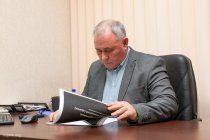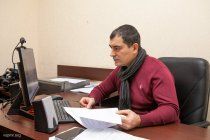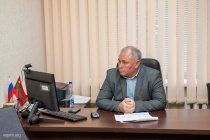 Русский
Русский English
English-







The discussion of the problem of ownerless non-residential objects continues
One of the points of the tasks set for 2023 by the Supreme Council by President Vadim Krasnoselsky during his Message to the state authorities and administration on January 17 was to continue work on improving the legislative norms regulating the procedure for the alienation of ownerless non-residential buildings and premises.
A specially created working group of the Supreme Council has been dealing with the problem of ownerless non-residential buildings and premises since last year. Parliamentarians and specialists of the committees are in dialogue with representatives of state administrations, city and district councils, the Ministry of Justice, the state supervision service and other departments. The main goal of the discussion is to collect opinions and suggestions from "practitioners" in order to develop a mechanism for solving the problem of ownerless objects and to prescribe a certain step-by-step algorithm of actions in the legislation.
Another online meeting of the working group took place under the auspices of the Committee on Regional Policy, Local Self-Government and Housing and Utilities today. The participants continued to discuss the action plan developed by the deputies and specialists of the Supreme Council for each option for private property:
1. the property has an owner who keeps his property in poor condition, the location of the owner is known and it is possible to contact him;
2. the property has an owner who keeps his property in poor condition, but it is not possible to establish contact with, and the owner’s location is unknown;
3. there is no information about the owner of the property.
It was noted that last year the Supreme Council adopted amendments to the Civil Code and the law “On local authorities, local self-government and state administration in the PMR”. However, these accepted norms do not solve the whole range of issues that arise in practice by the performers, the deputies of the Committee emphasized. Therefore, the discussion of all problematic issues continues within the framework of the working group.
The participants in the course of the today's meeting raised issues related to the creation of a unified register of ownerless non-residential objects and premises, where it is planned to include objects of all forms of ownership: state, municipal and private. Another point that should be spelled out in the law: which of the state power and administration bodies should maintain such a register if created.
An opinion was expressed that it is necessary to give more powers to state administrations in terms of requesting information about the owner's tax debts. They talked about other issues that “delay” the local authorities to take this or that decision on problematic objects. As a result, they spoil the look of cities for years and are dangerous for passers-by or people living nearby.
Participants talked about more effective ways to notify owners, possible methods for checking the wear and tear of buildings, options for selling abandoned properties to another owner, and other issues that arise in practice.
All points voiced at the meeting of the working group on ownerless non-residential facilities and premises will be worked out in detail by the deputies and specialists of the Supreme Council. The next meeting is scheduled for early March.




